Due to Christmas there was no rewatch on Monday, and this one’s a bit late due to holiday cheer, but we should be back on track next week/next year with “Yesterday’s Enterprise” on Monday the 2nd and continuing every Monday and Thursday in 2012.
For all of you who’ve been rewatching with me, reading, commenting, and so on, thank you so much. It’s been tremendous fun to re-live the glory days of TNG with you all, and I look forward to continuing it into 2012, assuming the world doesn’t end. (Stupid Mayans…)
Onward:
“A Matter of Perspective”
Written by Ed Zuckerman
Directed by Cliff Bole
Season 3, Episode 14
Production episode 40273-162
Original air date: February 12, 1990
Stardate: 43610.4
Captain’s Log: Picard is among those attending an art class. Data comes in and reports that the away team has returned from their mission to the Tanuga IV research station. La Forge, however, has beamed back alone—Riker stayed behind because Dr. Apgar, the head researcher, wants to have a word. Just as O’Brien beams Riker back, the station explodes. Apgar was the only one on board.
Krag, an investigator from Tanuga, comes on board wanting to take Riker into custody for murder. Two witnesses have come forward testifying to threats Riker made against Apgar, which, in Tanugan jurisprudence, is enough to arrest.
While they are under Tanugan jurisdiction, it is up to Picard’s discretion to accede to the extradition request. Krag insists he must interrogate Riker and the other witnesses on the surface because he must re-create what happened. Picard suggests a compromise: he use the holodeck to literally re-create the events, which Data assures them can be done, supposedly with a “nominal” eight percent or so margin of error.
Krag agrees. La Forge, Data, and Wes do the holodeck work, programming the holodeck with depositions from all the witnesses. Picard, Troi, and Krag will watch all the re-creations and Picard will judge—with Troi’s help—whether or not extradition is warranted.
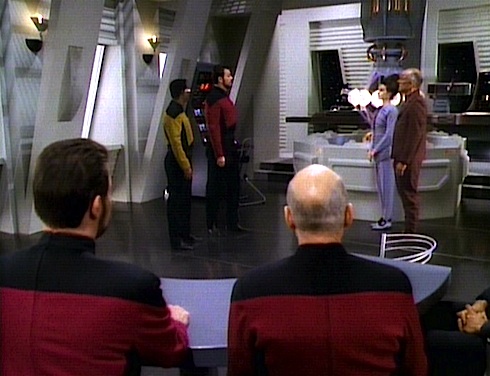
First we get Riker’s story: he and La Forge beam onto the station and meet Apgar and his assistant Tayna and his wife Manua. Apgar resents Riker’s presence, as he’s only suffered a few setbacks—but Riker assures him that they’re just checking up, there’s no pressure.
Manua insists that they share a drink. He mentions that the Enterprise has returned to its scientific mission. Apgar isn’t thrilled that they’re staying overnight, but Riker assures them that they made arrangements on the planet. Manua insists that they stay on the station. Krag makes a point of verifying that it was Manua’s idea that they stay on the station, not Riker’s.
When she shows Riker the guest quarters, Manua immediately starts hitting on Riker, who resists every forward pass. Apgar storms in, unsurprised by his wife’s attempt at infidelity, and he slaps Manua and takes a swing at Riker (and misses completely, Riker having easily ducked it). They both leave; the next morning, Riker insists it was a misunderstanding, but Apgar is completely paranoid about his work, and is concerned that Riker will give Apgar a bad report if Apgar files a grievance regarding Riker’s behavior.
Riker beams back. Krag, however, has a wrinkle: their scans based on the telemetry from the ground computer on Tanuga indicate that a focused energy beam hit the reactor from where Riker was standing. That suggests that he fired his phaser on the reactor just before transport.
La Forge, Data, and Wes verify Krag’s findings, then Worf picks up a radiation burst that puts a hole in a bulkhead. They can’t identify the source or type of radiation.
Next we get Manua’s story: Where Riker’s version of Manua was flirty and frustrated, Manua’s own version is demure and supportive. Also in her version it’s Riker who hits on Manua. Apgar’s concern is more confusion than paranoia. Also, Riker asks to stay on the station. (It’s never mentioned that, if La Forge and Riker made arrangements to stay on the planet, that could be verified with whoever they made arrangements with.)
Riker then tries to rape her, which Riker points out is patently absurd, before Apgar interrupts. He takes a swing, but this time Riker beats the crap out of him and threatens him.
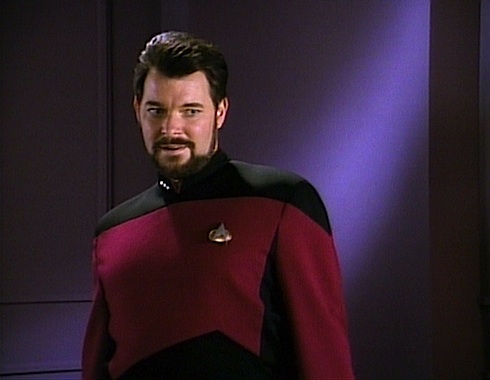
Another radiation burst hits sickbay, exactly five hours, twenty-three minutes, and six seconds after the last one—which was four times that interval after the station exploded. That’s too precise an interval to be coincidence, but they don’t know much beyond that, except that they know when the next burst will probably hit.
Next, Tayna testifies as to what happened in the guest quarters, based on what Apgar told her. Picard and Riker are dubious, as this is hearsay. In this version, Riker and Manua are in a mutual embrace, with neither resisting, and it’s Apgar who beats the crap out of Riker (which is fun to watch, but also patently ridiculous). Riker then threatens Apgar’s life. Apgar goes and tells Tayna what happened, tells her to take Manua to the surface, and stops her from calling the authorities, as he says he’ll take care of everything.
At this point, Picard has to allow extradition. There’s enough evidence to support it, though there is not, in Picard’s opinion, sufficient evidence to prove his innocence.
However, Data then reports that he, Wes, and La Forge have found the source of the radiation bursts. There’s a lambda field generator on the surface that fires an energy burst, then needs five hours, twenty-three minutes, and six seconds to recharge. It was left running after the station exploded.
Everyone is gathered on the holodeck for the final re-creation, from La Forge. It turns out that the radiation that has been hitting the Enterprise are Krieger waves. Far from being delayed in his breakthrough as he claimed, Apgar had already figured out how to create them. The converter that he said didn’t work actually worked just fine—and they re-created it on the holodeck. The bursts from the planet were being altered into Krieger waves by the holographic converter, and striking different points on the Enterprise, depending on their orbital angle relative to the field generator.
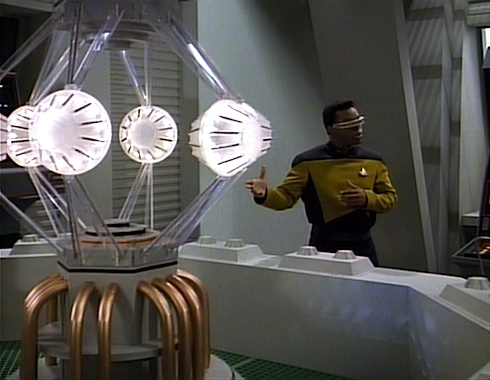
Picard hypothesizes that Apgar and Manua’s talk of great rewards—seen in both Riker’s and Manua’s testimonies—indicated that he had another client in mind besides Starfleet for Krieger waves. La Forge does the end of Riker’s testimony over with the Enterprise in the spot where the space station was, the holographic converter in the same place when the field generator hits it again.
Sure enough, the energy is converted into Krieger waves by the holographic generator and strikes Riker in mid-transport. It was an attempt by Apgar to kill Riker, making it look like a transporter accident, but instead the focused Krieger wave hit the transporter beam and reflected back onto the generator, causing the explosion.
In light of the new evidence, Krag withdraws the extradition request, the Enterprise leaves, and everyone lives happily ever after. Well, except for Manua, who’s lost her husband and then found out he was a traitor and a murderer, and Tayna, who’s out of a job, but hey, at least Starfleet has their Krieger waves
Can’t We Just Reverse the Polarity?: The holodeck doesn’t actually create the Krieger waves, simply provides a means by which the energy can be converted into it. The show’s scientific advisor at the time was David Krieger, and he suggested the solution of having the holodeck create a converter so they wouldn’t violate the rule that the holodeck can’t create anything harmful. In return for this assistance, the radiation was named after him.
Thank You, Counselor Obvious: Riker pleads with Troi after Manua’s testimony that she can’t possibly be telling the truth, but Troi says that she’s telling the truth as she remembers it—as is Riker. She senses no deception from either of them.
If I Only Had a Brain…: Data struggles initially with commenting on Picard’s painting, but then jumps whole hog into a rather brutal critique, to wit…
I Believe I Said That: “While suggesting the free treatment of form usually attributed to Fauvism, this quite inappropriately attempts to juxtapose the disparate Cubistic styles of Picasso and Leger. In addition, the use of color suggests a haphazard mélange of clashing styles. Furthermore, the unsettling overtones of proto-Vulcan influence—”
Data’s commentary on Picard’s “Nude In an Awkward But Appropriate For Broadcast Standards & Practices Position,” which is interrupted by Picard not really wanting to hear anymore for some odd reason.
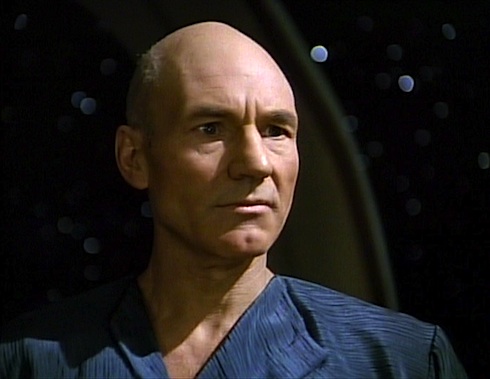
No Sex, Please, We’re Starfleet: We never do find out how much of the flirting was on Manua’s part, how much on Riker’s, and how much was mutual. Neither Manua’s nor Apgar’s portrayals of Riker were remotely in character, but his discomfort at the beginning of the episode very much gives the impression that he was macking on Manua too. If he was as innocent as he claimed in his deposition, he had no reason to be so concerned.
What Happens on the Holodeck Stays on the Holodeck: The use of the holodeck to re-create events based on depositions is actually a useful tool for this sort of inquiry. It wouldn’t really work as evidence, but it’s good for this grand-jury-style investigation.
Welcome Aboard: Craig Richard Nelson is nicely snotty as Krag, but he’s the only worthy guest star. Mark Margolis is flat as Apgar, though he does manage to convey the differences in tone depending on the deposition in question. Gina Hecht and Juli Donald are relentlessly mediocre as Manua and Tayna.
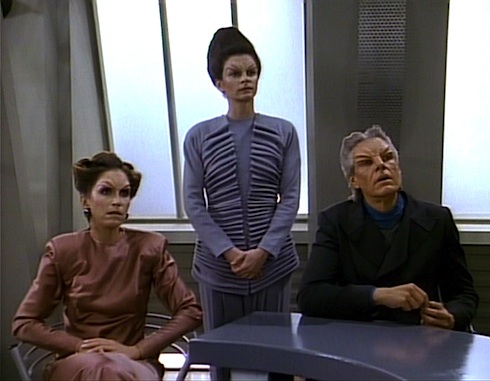
Trivial Matters: The model for the research station is a reuse of the Regula I model from Star Trek II: The Wrath of Khan, itself a reuse of an orbital office complex in Star Trek: The Motion Picture.
This is the one and only time we see Picard painting. Based on Data’s commentary, that’s probably for the best. (The original script called for Picard to respond to Data’s critique by splashing red paint all over the painting, ruining it, but it was cut—which is for the best, as that’s a very un-Picard-like move.)
Make it So: “She’s lying, that never happened!” One of the greatest films ever made is the 1950 Akira Kurosawa classic Rashomon. It has three people sitting in a shelter waiting out a storm. Two of them—a woodcutter and a priest—tell the third person the story of what they just experienced. We then are told the story of a couple (a samurai and his wife) who encounter a bandit in the forest from four different perspectives: that of the bandit, the wife, the samurai (through a medium who speaks to his spirit), and the woodcutter who saw the whole thing go down.
What’s great about the movie is that we don’t know which is the “real” story. There are reasons not to believe aspects of any of the stories, and the truth is likely some combination of all of them.
Pretty much every TV show in the history of the universe has done their own riff on Rashomon, from The Dick Van Dyke Show to All in the Family to Good Times to Farscape to CSI to Leverage. The mistake that far too many of them make is to miss the point of the movie: that every narrator is unreliable. The woodcutter is just as unreliable a narrator in the original as the samurai, the bandit, and the wife, and we don’t know the full story of what happened, though we can take a shot at putting it together.
“A Matter of Perspective” fails utterly in this, made all the worse by the fact that it apes the general structure of Rashomon so meticulously. Riker is the bandit, Apgar is the samurai, Manua is his wife, and Tayna is the medium who provides the dead man’s testimony. The final story is from La Forge who, like the woodcutter, was there also.
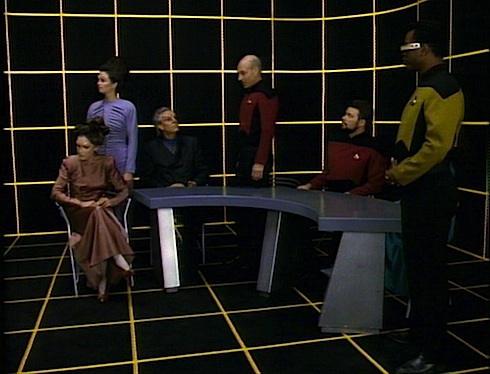
But it misses the point. For starters, we know William Riker after two-and-a-half years, so we know how he’ll behave, so we absolutely know that Manua and Apgar’s portrayals of Riker are wrong. Further, La Forge’s reveal that Apgar tried to kill Riker and failed, killing himself, takes the wind out of the sails of the entire plot. By establishing a final truth, all the sops to unsurety—Troi’s insistence that Riker and Manua are both telling the truth as they remember it, for example—become meaningless.
Worst of all, the issue of Riker’s possible dalliance with Manua is glossed over. Manua’s claim of rape (though Riker’s the only one who uses that word) is never finally addressed, and it’s the one bit of uncertainty that remains: did Manua hit on Riker, as the latter claimed, was it the other way around as Manua claimed, or was it mutual as Apgar claimed?
You’d think this would make the episode more palatable to me, but it doesn’t because we’re going to continue to see Riker for the rest of the series and four movies, and this will never be brought up again. Meanwhile, Manua has lost everything (since, on top of everything else, this gives us the tired, outdated cliché of the scientist with the pretty wife who apparently has no identity beyond that of scientist’s wife that was tiresome in 1950s sci-fi alien invasion flicks) and gets no justice on any level.
The scientific solution to the problem is rather elegant, and Picard’s conflict between duty and friendship provides a few good moments, but ultimately this is a dull, flat episode that doesn’t live up to the movie it’s imitating.
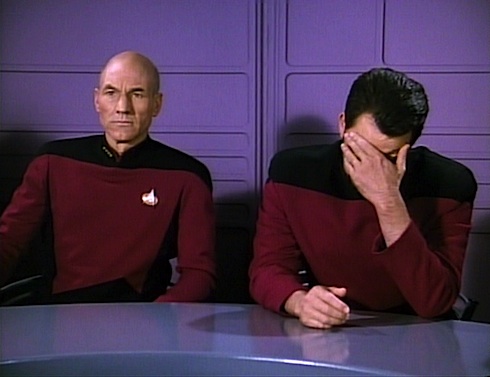
Warp factor rating: 1
Keith R.A. DeCandido lists Rashomon as one of his three or four favorite movies of all time, so this episode holds a particularly low place in his regard. Go to his web site for links to his blog, his Facebook page, his Twitter feed, not to mention ways in which you can buy his incredibly awesome books like the fantastical police procedurals SCPD: The Case of the Claw and Unicorn Precinct.










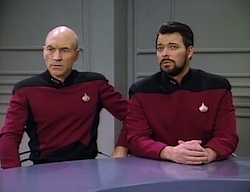
I’ve never seen Rashomon. You’re review makes me want to see it.
One need not have seen that film to realize that this episode is not that good. I liked it more then you, Keith, but that doesn’t mean that I liked it overall. This story goes along at a snail’s pace, to say the least, and an unstatsfying conclusion (you’d think Apgar would want to kill Geordi too, given his engeneering knowledge, and the fact that he had “full access” to Apgar’s records… I guess leaving first may have saved Geordi’s life here) does not help matters. If I’m Krag, I’d still ask for more then what Geordi gave me before I drop the extradition, but I guess we only have 42 minutes (he still would have gotten off had Geordi shown Krag the trouble spots on the ship).
I did like Picard denying Riker’s request to meet in private. The look on Riker’s face after that said it all.
The good news watching this one in reruns, is that we know what is coming up next. Happy New Year to all!
Hmmm. Seems to me if they’d only used a Lambda Lambda Lambda field generator instead, we could’ve had a remake of Revenge of the Nerds. Ah, what could have been…
If you’ve never seen Rashomon, run, don’t walk to the DVD store and get it. Kurosawa is rightfully one of the greatest directors (many say THE greatest) that ever lived, and this is one of his masterpieces. I cringe inside whenever I see a Rashomon ripoff
Usually, when a Rashomon episode appears on TV, that usually means the well has run dry – a “jump the shark” moment. Fortunately for TNG, they pull out of it nicely.
That I can recall in recent (ok, almost 2 decades :) ) memory, only the X-Files’ Jose Chung’s “From Outer Space” does it well. Charles Nelson Reilly rules ;)
Hmm. I haven’t seen this one in about ten years, but I can recall really liking it when I first saw it. I always liked the denouement – a massive explosion that reveals the bare walls of the holodeck. Your point is taken about Riker’s character – certainly little was done with the possibility that the pair of them were actually involved IIRC – but even so, I felt the sense of his being imperilled was sustained (all the more so, actually, given the fact that Picard was the one doing the arbitrating, and as such had to bend to the laws of another planet). I’m intrigued to watch it again now, to see about the pacing if for no other reason. Only seen one Kurosawa film, but evidently I must watch Rashomon!
AHHHHHHHHHHHHHHHHH! This episode pissed me off the first time I saw it. I yelled through the whole thing. Where was the phaser that Riker allegedly used to blow up the station? He didn’t have one when he beamed back to the Enterprise! Did he have one when he beamed over?! I think not, it wasn’t that kind of a mission!
No phaser – no story. Done.
*headdeskbeating*
One review described this episode as “trying to do Columbo.”
I can take or leave the episode as a whole, but Data’s art critique is priceless.
First off let me storongly second the suggestion that if you have not seen Rashomon, do so if you have a taste for foreign film and stories that are about life’s uncertainties. Rashomon is one of my favorite films and it’s always a horror when someone tries to do another serious version. It doesn’t do you any good to draw a comparison between yourself and on of the all time great masters. (Comedy is another matter, News Radio did a take of on Rashomon and it was great, but with comedy you know they are not comapring themselves to the originial.)
The fatal flaw in this episode is two fold, firstly Rashomon is character driven the different truths presented all deeply reflect the character of the presenter. It’s not Riker’s character to assume all women love him so Riker’s version feel forced and false. Secondly, Rashomon is about truth being utlimatly unknownable, the supposed objective viewpoint of thewoodcutter is revealed to be just as distorted as the others. There is no final true version presented with the theme that we each live and create our own truths being a very powerful one. SF, being a rationalist artform requires an objective reality and truth, hense Geordi proves Riker’s innocence and reveals the ‘truth’, such an ending is utterly at odds with the very central themes.
(On a Star Trek tangent, There is a film adaptation of Rashomon as a Western staring Paul newman as a Mexican Bandito and a young William Shatner as an idealistic young priest.)
This is probably one of the worse episodes done, marginally better than the clip show of the Riker’s memories and the parasite trying to kill him.
I lovE this episode. I think its due to the score. And while i really think o brien should have testified saying, ” no the commander did not beam over holding his phaser and i did not detect an active weapon during beam out.”
I enjoy watching this one. It should have deserved at least a two.5
Keith,
you have a renewed my faith in humanity for the new year! I loathed this episode and thought it was an offensively bad and basically an exercise in character assassination of poor Will Riker.
I am pleased to itty-bitty bits that you reviled it as much as I did!
Happy New Year!
Bel
Voyager did this kind of episode a bit better in Ex Post Facto, given Tom Paris as a much more unreliable witness with a checkered past who we haven’t known long enough to trust.
I don’t know…I think the review’s a bit harsh….I mean, yes, as you point out, no one checks on the planet side hotel whre Riker and Geordi had reservations and, yes, as Teri Lynn points out that transporter records and O’Brien can testify that there was no phaser, and yes, Riker’s version is pretty much going to be the actual truth, because we’ve seen that despite his man-whorenish self, it doesn’t fit he’d start hitting on someone’s wife……
where was I going with this comment again?
Keith,
I think you hit the nail on the head when you said this:
“But it misses the point. For starters, we know William Riker after two-and-a-half years, so we know how he’ll behave, so we absolutely know that Manua and Apgar’s portrayals of Riker are wrong.”
Exactly. What’s the point of placing Riker into this situation when we know that in this case at least his behavoir would be above reproach?
— Michael A. Burstein
I always liked the follow up scene to the data art critique:
Picard: Thought about what you said to me the other day, about my painting. Stayed up half the night thinking about it. Something occurred to me… fell into a deep peaceful sleep, and haven’t thought about you since. Do you know what occurred to me?
Data: No, Captain.
Picard: You’re just an Android, you don’t have the faintest idea what you’re talkin’ about.
Data: Why thank you, Captain.
Pickard: So if I asked you about art, you’d probably give me the skinny on every art book ever written. Michelangelo, you know a lot about him. Life’s work, political aspirations, him and the pope, sexual orientations, the whole works, right? But I’ll bet you can’t tell me what it feels like in the Sistine Chapel. Because you wouldn’t have the input to answer. I’d ask you about love, you’d probably quote me a sonnet. But you’ve never looked at a woman and been totally vulnerable. Known someone that could level you with her eyes, feeling like God put an angel on earth just for you. Who could rescue you from the depths of hell. And you wouldn’t know what it’s like to be her angel, to have that love for her, be there forever, through anything, even through hair loss. Because you will never lose your hair or know what it feels like. When I look at you… I don’t see an intelligent, confident man… I see a really good neural network. You’re at genius level, Data. No one denies that. No one could possibly understand the depths of you. But you presume to know everything about me because you saw a painting of mine, and you ripped my fucking life apart?
I don’t agree with most of the other reviewer’s at all! I liked this episode because of how it deals with Riker’s womanising – we see it all the time, but in this case, we finally see it from the other side. Manua’s story didn’t seem *too* far fetched given the Riker we’ve seen in other episodes. I’d say it was only a little extreme, as coloured by her personal interpretation of his advances, and I can see where that could happen given his usual style with the ladies. I’d certainly find him intimidating and probably a bit creepy if he hit on me.
I’ve also never seen that plotline before, and wasn’t aware it was based on something else, so I wasn’t disappointed by it in that sense. I thought it did very well at portraying the effect of different viewpoints on the same scenario, and was suitably unresolved re. whether Riker or Manua was the pro-active flirt. Given Manua’s testimony, which she believed to be true, it seems to me that Riker hit on her, not realising she wasn’t interested and that in her memory, it was quite undesirable and traumatic.
I like the ambiguity of it all, and the fact that it finally considered that not every woman in the galaxy will automatically fall for Riker, and the consequences in such a situation. One would hope he would learn from it…
This really is a 1, it’s a terrible episode even without the failed Kurasawa connection.
euphbass: quite. A so-so episode of this variety, not brilliant but not awful either: I’d give it a 5. (And I’d give the score a 10. Getting rid of Ron Jones was wrong, wrong, wrong.)
I dissent. This episode, if viewed as a quasi-trial episode, works-in fact, I’m surprised that you one the one hand analogized it to the Grand Jury and then rejected it without further discussion. Generally, a grand jury is a secret proceeding and the question is: Based on the facts and circumstances and the evidence presented, would a reasonable person, believe that a crime has been committed. Picard is facing that question-Is it more likely than not that Riker has committed crimes on the Tanuga Station such that he should be extradited?
The justice system, particularly, the grand jury, is very fallible. The prosecutor presents in secret. The defendant may appear and testify but otherwise has limited rights. In the words of Judge Sol Wachtler, a “grand jury could indict a ham sandwich.” This episode elucidates that fallibility.
Picard, as one-man grand juror (a la a system in Connecticut where Superior Court Judges can sit as investigative one-man grand jurors in the appropriate case) does not have to convict Riker. Picard has to assess Riker’s actions-notwithstanding Riker’s character-and assess and weigh the evidence to determine if Riker should stand trial. Manua, as Troi points out, truly believes Riker attempted to sexually assault her and had the intent to murder her husband. Manua is fairly comparable to any grand jury complaining witness. Tayna’s hearsay would be admissible in the grand jury. Picard, as one-man grand juror, can call Geordi LaForge-or Riker can call him, given that Geordi LaForge has been investigating and would offer relevant information or knowledge. Geordi LaForge’s perspective is flawed too-he was there but he is biased to help Riker. And Picard weighs it, and determines that it is not more likely than not that Riker committed a crime-it is quite simply a tragic accident.
All in all, if this episode is viewed as an analog to a Grand Jury, it works-particularly to show the difficulties and fallacies of the process. We also have some ingiths into Picard’s character-the tear between duty and friendship.
I enjoy this episode. I suspect that may be the lense of the grand jury I see this episode through. I also never saw Rashomon. But, I still find this episode good storytelling.
So, I respectfully dissent.
Like euphbass, I disagree with the review. Okay I get its formatted after a movie, but this is broadcast television, 40-odd minutes to work with. I rather enjoyed the completely out-of-character interpretations of Riker from Manua and Tayna in their utter absurdity. And we really don’t know what happened between Manua and Riker; as you point out, its some combination of the testimonies. Finally the highly intelligent answer involving the Kreiger waves absolutely is the saving grace of the episode. That alone warrants the episode rated at least a 5 or 6. (I’ll see the movie, but I doubt it will change anything. Besides when you’re a layman without the fancy movie knowledge, the episode works just fine.)
Further as Scavenger points out, it does seem out of character for Riker to hit on a married woman, another plot point enjoyable in its absurdity.
One more thing: Big Joe S’ assessment of the episode as an exercise in the grand jury process is truly spot on. That element also gives the episode a very interesting dimension.
This one may not be a classic, but it holds your attention and in my books, that makes it decent. A “1” is a silly rating. It’s a solid 7 and better than 90% of Season 7’s drivel.
I liked this episode as well, I’m giving it a 7.
I think it was fun to see the different versions of Riker. I loved the different fights, first Riker defends himself, then he slugs the guy, then its Riker that is hitting the deck!
Also the flirting too! Fun stuff.
Plus we get some Sci-Fi with the Krieger waves and the mysterious 5 hour interval. A good mystery, even if the explanation is goofy.
“A Matter Of Perspective” has to be the worst TNG episode. I watched it today and it was horribly boring and stupid. I’m thinking they needed to make an episode on the cheap. Very disappointing.
That last scene before the main title screen – the one where O’Brien tells Riker that the station has blown up, causing Riker to uselessly emote in the general direction of the transporter – pretty much says it all for this episode.
Oh, well. We got the double-facepalm meme out of this episode. That’s pretty good.
Not nearly as dreadful an episode as Krad and a few others have suggested. Comparing a 40-minute TV episode to a masterpiece like Rashomon and ripping it completely apart because “it doesn’t work like the movie” is unfair and wrong. “1” IS a silly rating, especially when you’ve given “Sub Rosa” a 3…
(Comment deleted by its author)
While the concerns with the episode are valid (it’s obvious that Riker is not a murderer and we SAW that he doesn’t have a phaser when beaming over + the computer would have the info if he beamed with a weapon etc.), but the funny thing is that they could have simply solved these by using a guest character as the suspect. Of course than we would not worry about it so much if the person is guilty or not, but considering we know Riker, this version doesn’t leave much suspense either…
To be honest, you seem to contradict yourself. You want it to leave something unanswered, but you criticize that what Riker really did was unanswered.
And I don’t think not adhering to the formula set up by the movie is bad. I hate it when reviewers use outside information to judge films like this. It was bad when you gave an episode a good review because it mimicked a movie (The Big Goodbye–which should have been marked down for not being science fiction) and it’s bad now.
Heck, you admit to liking the premise of using this as part of a grand jury. So why do you object then it is used as such and there isn’t enough to indict? Why does failing to be Rashonon mean the show is bad? You don’t explain.
I’m not saying this a great episode. I think it’s average for Trek. But you seem to really hate it for some reason, and I don’t get it.
This may be inspired by Rashomon and it certainly is constrained by circumstance to have much lower ambition than that film (it’s not like that the truth could be left unresolved), but that doesn’t inherently make it a failure. It uses the multiple perspective concept for a courtroom whodunnit rather than a examination of human perspective. What’s wrong with that?
It may be hard to ignore the episode using the same tools as a superior piece of art but this review is far, far too harsh. This was not a bottom-of-the-barrel effort.
1 is an extremely biased rating. I don’t doubt Rashomon is as good a movie as people here are saying, but not everyone reading these reviews has seen it. Also, In an episodic show with regular characters, I don’t see how a true Rashomon homage could be done without one of the characters being a regular cast member. By extension, in the third season of said show, we’re going to know enough about said character to know that he’s innocent or not. “It’s not Rashomon!” is not a good enough reason to contribute so strongly to a 1 rating.
Years too late, but I thought someone should give props to Bryan @14 for the Good Will Hunting riff. That was fun. Also, I’ll agree with those who do not believe this episode should be treated so harshly simply because it doesn’t hold up well against Rashomon. As @31, suggested, only a few people who watched this episode have attempted to watch Rashomon, and even fewer could sit all the way through it. Even with a crappy adaptation, I appreciate the effort – I’m hoping that at least one person who’s never heard of Rashomon was watching this with a cinephile, who recognized the homage and turned that person on to Kurosawa.
So looking at it for what it is, rather than what it isn’t, I’d rate this on the downside for the rather clunky script as I completely agree that the story is hopelessly flawed in that we know Riker’s a rake, but not a rapey rake, so there’s not much left to do but wait to find out who the bad guy is. But I was not bored watching this, and it had some nice moments. And it was fun to watch Frakes going all over-the-top…
4 for me….. but as someone else suggested if we’re grading on the Sub Rosa scale, this is at least a 5. :)
This is one of the worst TNG episodes by far. There was simply never any real reason for suspense. What other outcome could there have been? Riker is convicted as a murderer and attempted rapist? Riker IS a murderer and attempted rapist? Pure absurdity. We already know Riker to be a principled man with a strong moral compass. If the show had reason to discard him as a character, surely it would not be like this.
Seriously, I’m disturbed that another commenter referenced Riker’s “womanizing” as something that added plausibility to Manua’s story. Nothing about Riker’s past affairs suggest that he is the rapey type, and far less that he so completely lacks impulse control that he would attempt rape after but a few minute in the presence of a minimally attractive older married alien woman. There is simply no way such a slave to his impulses would achieve Riker’s level of achievement within Starfleet.
Manua’s story is the biggest issue here. She would have to be deranged and delusional to believe her own version of the story, given that Troy indicated she believes it to be the truth. At no point in even her own recreation was Riker in possession of a phaser, at least not until the moment he allegedly used it. So where did it come from? And we know that Riker was unarmed when he beamed back – something we can take as objective truth within the parameters of the story. And if Manua truly did believe her version to be true, then why did she barely react when her story was proven to be false?
Sorry, but anyone with a shred of horse sense should have had trouble accepting the plausibility of any of this episode. It should have been over before it started.
I might have hated this episode equally but the question of Riker’s behavior always intrigued me. Obviously, the other two portrayals of him were absurd. But I felt like even his own was a bit rose-colored, that likely he didn’t behave as well as he made himself remember. Obviously he would respect a marriage, but would he appear not to be affected by the wife’s appearance and behavior at all? Forehead accoutrements aside, she was attractive and welcoming, and I don’t see him reacting like a wooden post offered him a drink. And that fight scene? The guy just hit his own wife, and then has a go at Riker–he would certainly act with restraint, but I think he did a little more than step back out of the way.
I guess the main reason I like the episode a good bit, is because it goes into how even a sincere memory can be unreliable.
I don’t dislike this episode, but I think it failed miserably when it did not explain how Riker and Manua both thought the other was being sexually aggressive. What happened here?
covid 19 rewatch…
you know, i wonder how this episode would be received today due to the influence of ‘me too’ and ‘believe all women’. if the wife was telling the truth as she saw it, then was the real problem with riker reading in to her mild flirting? in this day and age it definitely takes some luster off will riker..
It’s not as good as “Rashomon” is an interesting point, but hardly enough to put this episode any where near 1 out fo 10 territory to me. Taking the episode on its own merits, it’s fairly entertaining to see the three versions of events played out by the same actors, and to ponder what they reveal about the characters doing the telling. The assistant’s obvious hero worship of the old scientist was especially amusing.
The points that Rey raises, on the other hand, are far more damning. On the observation that Manau would need to be delusional, I have known people that were incredibly talented at reinventing versions of past events that paint them in a better light. They sometimes believe those versions of events completely, it’s as if they have the ability to completely rewrite their own memories. It’s sad and sometimes frustrating, but it’s more common than you would think
It’s a dull episode, and I know they are riffing on the actual story in Rashomon but I was quite disturbed by Troi’s statement that Manua believed Riker had tried to rape her – when we all know that must be untrue. It ties in to misogynistic stories of women confusing regret with rape, that it’s he said/she said but women are the unreliable narrator because they won’t own up to their own desires. I heard a lot of that bilge when I was a young barmaid in the 90s, from men talking amongst themselves, and in real life I didn’t need to hear the woman’s side of the story to guess she wasn’t the most unreliable one.
Funny how one can think only of one solution…when re-reading this rewatch, my first thought was “why the hell they didn’t have a different character instead of Riker? someone we don’t know?” then i found that i posted the same thought already 7 years ago. Time flies. :D
Even without comparing this episode to Rashōmon in quality it’s a disappointing failure measured against its own potential that just doesn’t hold together.
The appearance by Mark Margolis qualifies as a Robert Knepper Moment for me. I don’t think he did a bad job, especially considering we never actually see the real, physical Dr. Apgar.
Funny; that’s not how I remembered this episode.
I’ve always loved the scene of Apgar’s account via his assistant. “Yeah, and then I sucker punched Riker and he hit the deck like a sack of potatoes!”
For this episode you need a different scale of rating. Maybe call it an Apgar Score? It has to get a bonus point for Riker yelling “You’re a dead man, Apgar, a dead man!”.
I have to read this review every time I rewatch TNG so that I don’t explode with annoyance. Thank you for pointing out that it’s a show trying to show an alternate ‘perspective’ to a woman who experiences rape – and that one of the key ways the show denies her experience is to use Riker as ‘the good guy we all know who wouldn’t do that’, but this only works because he’s a fictional character who we literally can and do know everything about. In real life it can never be this and the supposedly good people we know, or know of, are absolutely capable of awful things. Despite how much we like them.